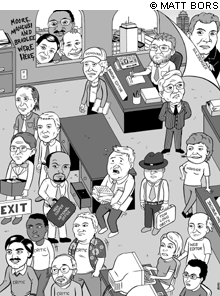There were more lumps of coal than holiday cheer at 135 Morrissey Boulevard this Christmas season.
 The invitation to the Boston Globe’s December 8 "Combination Christmas Party/Survivor Celebration" included the gallows-humor header: "Do We Ever Need a Party!" Editor Marty Baron’s year-end congratulatory e-mail opened with its own somber greeting: "I’m tempted, probably like many of you, to say good riddance to 2005."
The invitation to the Boston Globe’s December 8 "Combination Christmas Party/Survivor Celebration" included the gallows-humor header: "Do We Ever Need a Party!" Editor Marty Baron’s year-end congratulatory e-mail opened with its own somber greeting: "I’m tempted, probably like many of you, to say good riddance to 2005."
The proximate reason for the Yuletide pall was the wrenching round of company-mandated buyouts that claimed 32 newsroom jobs and ended the Boston Globe careers of some of the paper’s most identifiable bylines. As the year wound down, life at the Globe was marked by a relentless succession of bittersweet going-away parties for departing colleagues.
The editorial reductions struck hardest in Living/Arts — the features and arts section — claiming four critics, and the 25-year-old Life at Home section. The National department — which included an African-American editor, a roving reporter, and a New York–based staffer — was dismantled as well, raising doubts about the ambition and reach of a shrunken Globe.
"There’s a shock to the system anytime you have to do anything like this," says Globe publisher Richard Gilman.
But the visceral shock of the buyouts was compounded by deeply rooted fears at New England’s most powerful media outlet. Those fears were magnified because the Globe had fallen victim to the classic ills of the modern media world: cuts dictated by the out-of-town conglomerate that owns one of Boston’s distinguishing institutions at a time when the newspaper business is hemorrhaging jobs, circulation, and self-confidence, and everything from Knight Ridder’s empire to Pat Purcell’s Boston Herald is up for grabs.
Floating atop that simmering stew of anxiety is the nagging question of whether Baron — a smart, hard-working editor, but an uninspiring newsroom leader without strong people skills — can rally the sagging troops at what is the most uncertain, uncomfortable, and unsettling moment for the Globe since Tom Winship turned it into a national force three decades ago. (Yes, that awful 1998 stretch when the paper lost columnists Mike Barnicle and Patricia Smith after they were caught in journalistic sins was traumatic. But now, the very character and future of the paper seem to hang in the balance.)
Metro columnist Adrian Walker has endured three Globe buyouts. "This one was the most emotional and difficult," he says. "There is the most concern that we have long-term problems."
Another staffer describes the mood as "uncertain and nervous and worried. It’s a question of buckling our seatbelts for the bumpiest ride ever. This is where leadership needs to instill some confidence, some resolve."
Changing of the guard
Not only inside the building, but outside as well, word of the Globe cuts rattled nerves.